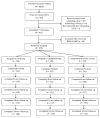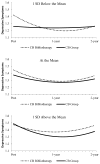Effectiveness trial of an indicated cognitive-behavioral group adolescent depression prevention program versus bibliotherapy and brochure control at 1- and 2-year follow-up
- PMID: 25894666
- PMCID: PMC4516674
- DOI: 10.1037/ccp0000022
Effectiveness trial of an indicated cognitive-behavioral group adolescent depression prevention program versus bibliotherapy and brochure control at 1- and 2-year follow-up
Abstract
Objective: The main goal of this study was to evaluate the long-term effects of a brief group cognitive-behavioral (CB) adolescent depression indicated prevention program through 2-year follow-up, relative to CB bibliotherapy and brochure control, when high school personnel recruited students and delivered the program.
Method: Three hundred seventy-eight adolescents (M age = 15.5, SD = 1.2; 68% female, 72% White) with elevated self-assessed depressive symptoms who were randomized to CB group, CB bibliotherapy, or educational brochure control were assessed at pretest, posttest, and 6-, 12-, 18-, and 24-month follow-up.
Results: By 2 years postintervention, CB group participants showed significantly lower major depressive disorder (MDD) onset versus CB bibliotherapy (10% vs. 25%, respectively; hazard ratio = 2.48, p = .006), but the incidence difference relative to brochure controls (17%) was nonsignificant; MDD incidence for bibliotherapy and brochure controls did not differ. Although CB group participants showed lower depressive symptoms at posttest versus brochure controls, there were no effects for this outcome or for social adjustment or substance use over 2-year follow-up. Moderator analyses suggested that participants with higher baseline depressive symptoms showed greater long-term symptom reductions in the CB group intervention versus bibliotherapy.
Conclusions: The evidence that a brief CB group intervention delivered by real-world providers significantly reduced MDD onset versus CB bibliotherapy is potentially encouraging. However, the lack of MDD prevention effects relative to brochure control and lack of long-term symptom effects (though consistent with results from other depression prevention trials), suggest that the delivery of the CB group should be refined to strengthen its effectiveness.
(c) 2015 APA, all rights reserved).
Figures
References
-
- Abayomi K, Gelman A, Levy M. Diagnostics for multivariate imputations. Journal of the Royal Statistical Society: Series C (Applied Statistics) 2008;57:273–291.
-
- Ackerson J, Scogin F, McKendree-Smith N, Lyman RD. Cognitive bibliotherapy for mild and moderate adolescent depressive symptomatology. Journal of Counseling and Clinical Psychology. 1998;66:685–690. - PubMed
-
- Aiken LS, West SG. Multiple regression: Testing and interpreting interactions. Newbury Park, CA: Sage; 1991.
-
- Arnarson EO, Craighead WE. Prevention of depression among Icelandic adolescents: A 12-month follow-up. Behaviour Research and Therapy. 2011;49:170–174. - PubMed
Publication types
MeSH terms
Grants and funding
LinkOut - more resources
Full Text Sources
Other Literature Sources
Medical




